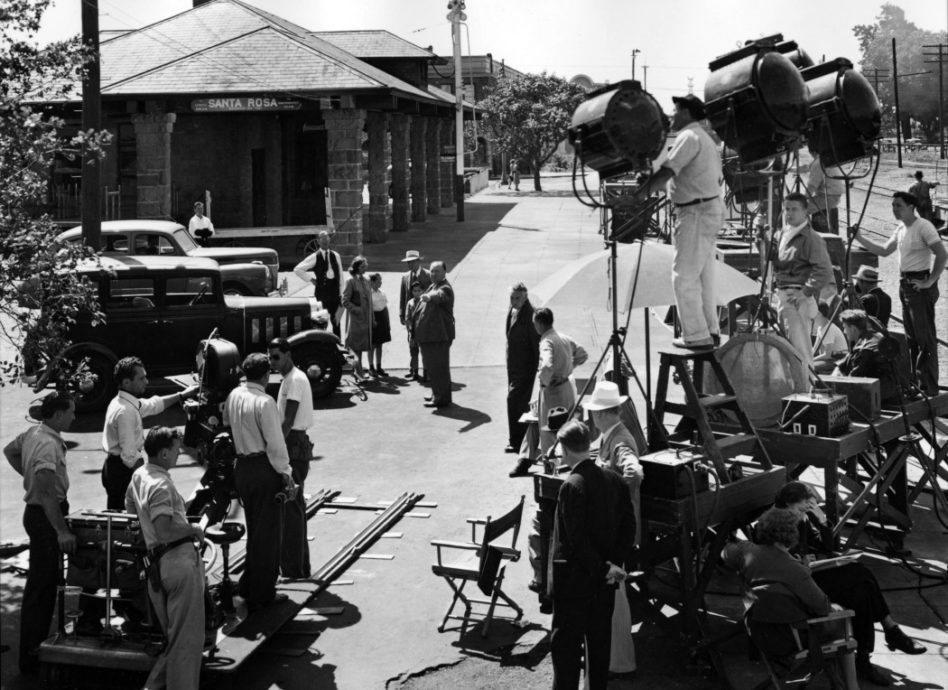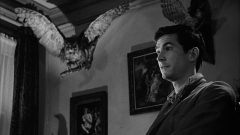Both Rear Window and Only Murders in the Building are democratic art forms that can make us better citizens.
The Poverty of Irony
We need great movies very much, because we are as a nation moralists, convinced we know how the world is—who’s good and who’s evil and why, and usually what to do about it, too. This is the thesis of a fascinating new book on film and morality by Robert Pippin. Indeed, with us, the very people who claim to be sophisticated, liberal academic elites who mock our ideas of equality before the law and individual accountability in justice, are also given to hysteria, demonizing their political adversaries, and are such conformists politically that you begin to fear totalitarianism.
But since great movies tell us that it’s not that simple, we need to interpret them to be benefitted by them, and who better to turn to than professional interpreters: Behold Robert Pippin, a distinguished scholar of German philosophy, and especially Hegel, whose stature is easily seen from his title, the Evelyn Stefansson Nef Distinguished Service Professor in the Committee on Social Thought and the Department of Philosophy at the University of Chicago.
Pippin has written three books on film over the last decade: Hollywood Westerns and American Myth (2010), Fatalism in American Film Noir (2012), and The Philosophical Hitchcock (2017). Now he has a new book, Filmed Thought: Cinema as Reflective Form, on movies by Hitchcock, Pedro Almodóvar, Roman Polanski, Douglas Sirk, Nicholas Ray, and Terrence Malick.
Hegel famously said it’s only in the twilight that we achieve wisdom—looking back, at the End of History, we can see everything finally make sense. This is especially true of Pippin recapitulating Hollywood history for the sake of those studious souls who want to better understand movies and look to the prestige of our academics for guidance.
Democracy and Aristocracy in America
At his best, Pippin offers daring observations about the people we see onscreen and about ourselves as viewers. We should understand ourselves in relation to them because they are Americans, too, if removed from us by a few generations—we have not changed so much, at least as yet, but enough time has passed to see what was wrong with certain beliefs we held about our communities. The best example is his discussion of Hitchcock’s Shadow of a Doubt (1943), a story about a mad killer fleeing dilapidated Newark to hide with his sister’s family in a quaint, sleepy town in California.
We see the cosmopolitan and the provincial here—the murderer Charles, played by Joseph Cotten, charms everyone with his style, money, generosity, and condescension. The townsfolk fawn over his pretensions just like in Mark Twain’s Huck Finn, because they worship beauty and sophistication, without realizing what terrible corruption hides beneath. Pippin treats the murderer as a nihilist whom the community cannot recognize for what he is because their way of life has stunted their judgment.
He criticizes the “ordinary” thoroughly through this perspective opened by moral blindness, without praising the extraordinary or cosmopolitan too much, since it opens up its own danger, nihilism. He even demolishes the seemingly affectionate family where no one pays attention to anyone else and everyone is trying to escape through fantasies. His care goes to the mother, who is the sister of the murderer, and her eldest daughter, our protagonist Charlie, played by Teresa Wright, who alone can see through the disguise. Pippin enjoys repeating the word incest as the subtext of the relations between the cosmopolitan man and the women stuck in an ordinary life, as though their affection is not a problem because it is directed to a mad murderer, but because it is love for a brother mixed with some kind of eroticism.
He never explains, unfortunately, what he means, or the bearing of this subtext on the story, except that ordinary life is stifling for women. Charlie, initially charmed by Charles, learns to suspect, fear, and finally confront him. Another fascinating thing Pippin discusses is how thoroughly the girl, just out of high-school, rejects the authority of the FBI, and their help, hoping to spare her mother the heartbreak of having her murderous brother arrested in her home.
Manliness goes unmentioned in this book, not by chance, I think.
Pippin insists that we should think about the film in Romantic terms. Charlie moves from innocence to experience, starting the movie idly wishing that something would finally happen in her sleepy town, and when excitement arrives, she is made wiser from this experience. Since he is a sophisticated man with remarkable erudition, he demurs from judging whether the girl Charlie, who goes from sweet adoration to threats of murder in defense of her family, is a good person. He points out instead that the city ends as it began, in the grip of its blindness.
Charlie ends thus almost entirely alone. She has learned that America is far more complicated than she had thought—there is true evil, but there is also a moral culpability in the indifference of the community. Ordinary life turns out to be dangerous to us, both for what it encourages us to applaud and what it prevents us from judging. Movies are supposed to reveal that and help us become, like Charlie, experienced. But Pippin doesn’t get around to saying whether the price we pay is not losing any possibility of community.
Manliness and Domesticity
The other Hitchcock movie treated in the book, Rear Window (1954), offers a good contrast to Pippin’s very sympathetic treatment of Charlie. To read Pippin, you might think that Hitchcock made a colossal mistake in casting Jimmy Stewart in the lead, since he’s a man and also well beloved by the audience. This popular character is, if possible, even worse than the ordinary townsfolk in sleepy California—a lazy, demanding, thoughtless brute.
Perhaps the master Hitchcock compromised with the intolerable audience by offering them a protagonist they can admire, but Pippin doesn’t have to do that. He seems utterly contemptuous of the male protagonist and utterly adoring of his better half, played by Grace Kelly. He makes you think that she shouldn’t in a thousand years fall for him, because he’s macho, won’t marry her, and isn’t even sensitive to her true nature, unlike Pippin. You and I might believe it makes a lot of sense for the beautiful woman to love the manly man, but the scholar is dead set against it.
Manliness goes unmentioned in this book, not by chance, I think. We foolishly identify with Stewart and think him the hero who almost gets himself killed solving the murder in the little apartment complex he spies on. Pippin instead quotes this sentiment approvingly: “Rear Window represents an unambiguous, sometimes even vicious broadside on the male psyche and male sexual insecurity,” and continues in his own words: “This is all clearly contrasted ironically with the fact that the cleverest, wittiest, and bravest character in the film is Lisa. She also has the most reliable moral compass.”
Pippin knows that there is such a thing as a protagonist and a plot in the movie, but he openly disdains these elements. He prizes instead, and you will guess this yourself if you know academics, irony. I owe Pippin my thanks for a new level of sophistication—before him, I confess I had never seen irony used as a verb, viz. to ironize. This doesn’t mean, as the simple might guess, to speak ironically—although, he assures us, Hitchcock is ironic whenever he shows us something we understand and approve—but something else. I confess I don’t quite know what—to ironize is perhaps to treat something as questionable and dubious rather than obvious. And yet Hitchcock insisted on telling a story where the manly man is necessary for the pursuit of justice, since he is willing to jump to conclusion about character from evidence of behavior, even if scanty, and trust his own judgment.
What is sacrificed by this dismissive attitude to men is the problem of justice, which is nevertheless natural and constitutive of our lives.
But we needn’t worry, as admiration for this extraordinary woman instead of the protagonist will be our guide, our Beatrice, if you will. Pippin assures us: “But [Kelly] is already chafing under [Stewart]’s thoughtless presuppositions about her and what she can and cannot do. She’ll show him soon how wrong he is.” Of course, it’s not just the protagonist who is full of thoughtless presuppositions, despite his intelligent conviction, which everyone else disbelieves, that evil is really and truly in their midst. We, dear reader, are just as bad as he:
The fact that [Stewart] was “right” about the murder is not a result of any interpretive finesse. He has the plot right, just as many viewers of Hitchcock watch and follow the plot successfully and take great pleasure in the technical brilliance of the editing, pacing, intersecting threads, and so forth. But they see nothing else, or they casually adopt some cliché about Hitchcock as their interpretive result, the meaning of the narrative: he is a perverse voyeur, a sadist, a cold, manipulative technician, a champion of the male gaze, a Catholic director convinced of universal and profound sinfulness, a cynic, or even the much more accurate cliché, but still a cliché, that he is a “humanist” at heart, and so forth. Many of his films, but especially Rear Window and Vertigo (above all, Vertigo), seem to me great protests against this.
In both movies, as in others in the book, Pippin offers us this triangle: In relation to ordinary people, there are two outsider types: Vicious men (Cotten, Stewart) and virtuous women (Wright, Kelly). The former can do no right, the latter no wrong. To be sure this is a simplification of Pippin’s argument, but it’s an accurate one, and this alliance of women and critics against men seems paradigmatic of liberalism. Pippin seems to think it will make us more tolerant.
What is sacrificed by this dismissive attitude to men is the problem of justice, which is nevertheless natural and constitutive of our lives. One of the two male protagonists is the problem, the other the solution. That’s our old-fashioned idea: It takes a good man to bring a bad man to justice. Pippin wants us instead to scrutinize ourselves, the ways society misleads us, encourages us to be superficial and inattentive to, well, himself—we should become more sophisticated. We should ironize men, justice, and murder. Artists, after all, know these are metaphors for our sexual inadequacies. Pippin insists as a very decent liberal, in several of the essays, that we shouldn’t rush to moral judgment and punishment, since phenomena and selves are actually very complicated. Perhaps liberals need moderation of their judgmental attitudes as much as the rest of us and it is to his credit that he tries to make people moderate. But however much he dwells on stories of murder and rape, he never gets around to saying when we might be reasonably sure of the justice of punishment, oddly enough.
This seems to me to be the limit of Pippin’s criticism. His essays are always interesting, but he asks of his readers that they throw away the plot and sometimes even the protagonist. Some will be willing, even eager to make that sacrifice, others loath, or indignant when they read Pippin suggest Stewart rather got his comeuppance for his impotent passivity, when he was almost murdered in pursuit of justice.
Hegel and You
Both movies and philosophy matter in our society, but they don’t work in harmony. Academics write more or less like Pippin, an erudite man on an impossible quest—to save Hitchcock from those who love him. The audiences remain unenlightened, since critics despise the protagonists we love, and the movies cannot improve either, since silence must be preserved on the genius of the directors, lest they be associated with such critics. It is now necessary to teach audiences about the greatness of the old Hollywood directors, both to understand our past better, and to understand the task of poetry in our new situation, since we obviously cannot rely on the spontaneous emergence of the geniuses that were once popular and even dominating in Hollywood. But if genius is understood as the denial of human nature, no wonder it is unpopular and uninspiring.
The reason for this divide looks like the quarrel between ancients and moderns. Aristotle, after all, taught us that plot is like the soul of tragedy—which we all believe when we are very serious about a story’s goings on and outcome. Aristotle told us nature is our guide and concern, even in poetry, the domain of the muses. We believe poetry when we recognize speeches and actions as plausible, and certain human types and problems as ones we ourselves experience.
But then we modernized, and Hegel said that only freedom, not nature, concerns us: we artificially create our own selves. Pippin follows him and says: “Representation is necessary to ‘self-realizing beings.’” When he says, following Hegel, “fine art is an indispensable form of collective human self-knowledge,” he doesn’t mean we get to ask who’s a good man or whether we are just. He means we should become ever more aware of moral complexities and how dubious anything we believe really is.
To follow this new path of freedom would mean for the academics to call themselves critical, us naïve, and then take over entertainment—to respond to our loves with jargon and to try to talk us out of the fears and hopes that lead us to be interested in the problems of justice—including the terrible crimes that we all know are real, but cannot explain, much less prevent, and which endanger our way of life, since evil can cause us to lose faith in justice.
This might sound great for liberalism, since it would mean we could all become well-adjusted, talk about our issues, and nobody would ever want to solve crimes or become a hero. Men would have to admit women are their superiors and women would have to learn to administer and order us all. We would all have to learn to look away from evil and remand it to custodial staff tasked with the administration of undesirable behavior.
Or we could go back to Hitchcock, who did indeed know America, but did not despise us or our heroes too much to make movies for us. We could try to understand the stories he tells about America as dealing first of all with our problems, not those of academics. There is much to learn from Pippin, but there is more to learn from Aristotle—first of all, to take the plot seriously. We also have every reason to believe Hitchcock would want us to do so—after all, academics, however much they love him, always transform his stories into jargon. Gone is the humor, gone is the seriousness, gone the elegance along with the strange events that suggest to us there may be more than meets the eye. I, for one, wish academics learned from Hitchcock’s poetry how to deal with audiences before they proposed to enlighten us.



